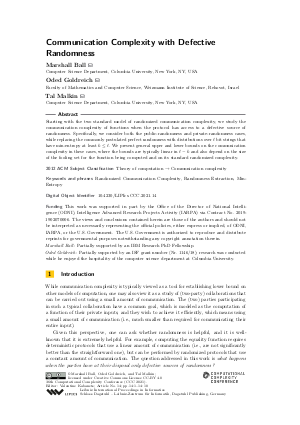Communication Complexity with Defective Randomness
Authors Marshall Ball, Oded Goldreich, Tal Malkin
-
Part of:
Volume:
36th Computational Complexity Conference (CCC 2021)
Part of: Series: Leibniz International Proceedings in Informatics (LIPIcs)
Part of: Conference: Computational Complexity Conference (CCC) - License:
 Creative Commons Attribution 4.0 International license
Creative Commons Attribution 4.0 International license
- Publication Date: 2021-07-08
File

PDF
LIPIcs.CCC.2021.14.pdf
- Filesize: 0.56 MB
- 10 pages
Document Identifiers
Subject Classification
ACM Subject Classification
- Theory of computation → Communication complexity
Keywords
- Randomized Communication Complexity
- Randomness Extraction
- Min-Entropy
Metrics
- Access Statistics
-
Total Accesses (updated on a weekly basis)
0Document
0Metadata
Abstract
Starting with the two standard model of randomized communication complexity, we study the communication complexity of functions when the protocol has access to a defective source of randomness. Specifically, we consider both the public-randomness and private-randomness cases, while replacing the commonly postulated perfect randomness with distributions over 𝓁 bit strings that have min-entropy at least k ≤ 𝓁. We present general upper and lower bounds on the communication complexity in these cases, where the bounds are typically linear in 𝓁-k and also depend on the size of the fooling set for the function being computed and on its standard randomized complexity.
Cite As Get BibTex
Marshall Ball, Oded Goldreich, and Tal Malkin. Communication Complexity with Defective Randomness. In 36th Computational Complexity Conference (CCC 2021). Leibniz International Proceedings in Informatics (LIPIcs), Volume 200, pp. 14:1-14:10, Schloss Dagstuhl – Leibniz-Zentrum für Informatik (2021)
https://doi.org/10.4230/LIPIcs.CCC.2021.14
BibTex
@InProceedings{ball_et_al:LIPIcs.CCC.2021.14,
author = {Ball, Marshall and Goldreich, Oded and Malkin, Tal},
title = {{Communication Complexity with Defective Randomness}},
booktitle = {36th Computational Complexity Conference (CCC 2021)},
pages = {14:1--14:10},
series = {Leibniz International Proceedings in Informatics (LIPIcs)},
ISBN = {978-3-95977-193-1},
ISSN = {1868-8969},
year = {2021},
volume = {200},
editor = {Kabanets, Valentine},
publisher = {Schloss Dagstuhl -- Leibniz-Zentrum f{\"u}r Informatik},
address = {Dagstuhl, Germany},
URL = {https://drops.dagstuhl.de/entities/document/10.4230/LIPIcs.CCC.2021.14},
URN = {urn:nbn:de:0030-drops-142886},
doi = {10.4230/LIPIcs.CCC.2021.14},
annote = {Keywords: Randomized Communication Complexity, Randomness Extraction, Min-Entropy}
}
Author Details
- Faculty of Mathematics and Computer Science, Weizmann Institute of Science, Rehovot, Israel
Funding
This work was supported in part by the Office of the Director of National Intelligence (ODNI), Intelligence Advanced Research Projects Activity (IARPA) via Contract No. 2019-1902070006. The views and conclusions contained herein are those of the authors and should not be interpreted as necessarily representing the official policies, either express or implied, of ODNI, IARPA, or the U.S. Government. The U.S. Government is authorized to reproduce and distribute reprints for governmental purposes notwithstanding any copyright annotation therein.
- Ball, Marshall: Partially supported by an IBM Research PhD Fellowship.
- Goldreich, Oded: Partially supported by an ISF grant number (Nr. 1146/18); research was conducted while he enjoyed the hospitality of the computer science department at Columbia University.
References
-
Ran Canetti and Oded Goldreich. Bounds on tradeoffs between randomness and communication complexity. Comput. Complex., 3:141-167, 1993.

-
Clément L. Canonne, Venkatesan Guruswami, Raghu Meka, and Madhu Sudan. Communication with imperfectly shared randomness. IEEE Trans. Inf. Theory, 63(10):6799-6818, 2017.

-
Benny Chor and Oded Goldreich. Unbiased bits from sources of weak randomness and probabilistic communication complexity. SIAM J. Comput., 17(2):230-261, 1988.

-
Martin Dietzfelbinger, Juraj Hromkovic, and Georg Schnitger. A comparison of two lower-bound methods for communication complexity. Theor. Comput. Sci., 168(1):39-51, 1996.

-
Yevgeniy Dodis, Shien Jin Ong, Manoj Prabhakaran, and Amit Sahai. On the (im)possibility of cryptography with imperfect randomness. In FOCS, pages 196-205. IEEE Computer Society, 2004.

-
Shafi Goldwasser, Madhu Sudan, and Vinod Vaikuntanathan. Distributed computing with imperfect randomness. In DISC, volume 3724 of Lecture Notes in Computer Science, pages 288-302. Springer, 2005.

-
Eyal Kushilevitz and Noam Nisan. Communication complexity. Cambridge University Press, 1997.

-
James L. McInnes and Benny Pinkas. On the impossibility of private key cryptography with weakly random keys. In CRYPTO, volume 537 of Lecture Notes in Computer Science, pages 421-435. Springer, 1990.

-
Ilan Newman. Private vs. common random bits in communication complexity. Inf. Process. Lett., 39(2):67-71, 1991.

-
Anup Rao and Amir Yehudayoff. Communication Complexity: and Applications. Cambridge University Press, 2020.

-
Ronen Shaltiel. An introduction to randomness extractors. In ICALP (2), volume 6756 of Lecture Notes in Computer Science, pages 21-41. Springer, 2011.

